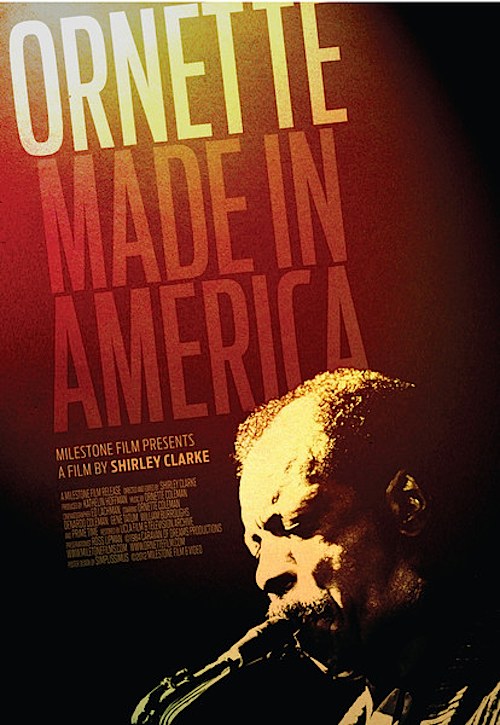By Joe Bendel. Ornette Coleman won the Pulitzer Prize for musical composition and performed live on Saturday Night Live. Although neither event is covered in Shirley Clarke’s classically idiosyncratic documentary-profile, viewers still get a memorable sense of the artist and his music in Ornette: Made in America, which opens in New York this Friday at the IFC Center, as part of Milestone Films’ Project Shirley restoration and rerelease program.
Explaining Coleman’s place in the jazz world would take some doing, especially in 1985, before his late career Grammy and Pulitzer accolades finally came cascading in. Coleman was one of the pioneers of the Free Jazz movement, whose legendary engagement at New York’s Five Spot club sharply divided the jazz world. However, you will not find his creation story here. Instead, Clarke’s approach to Coleman the man and the musician is deeply rooted in the then-current moment, yet is also rather timeless.
In the mid 80’s, the establishment (broadly defined) was just starting to understand that Coleman was a force to be reckoned with. As the film opens, the mayor of Fort Worth presents Coleman with a copy of the key to the city (the original, he explains, had been sent up into space or something), in the hours before the alto saxophonist-multi-instrumentalist will debut Skies of America, a major new composition integrating a symphony orchestra with his avant-garde electric combo Prime Time. Hizzoner’s speech might strike New York hipsters as a bit corny, but his drummer-manager-son Denardo is quite pleased his father is finally being recognized.
 In fact, there is something all-encompassing and Whitmanesque about Coleman’s deeply blues-influenced music that is perfectly represented by a title like Skies of America, as well as the mayor’s patriotically Texan remarks. Shrewdly, Clarke uses this fairly accessible work as the musical centerpiece for the film, much like Sonny Rollins’ concert premiere of Concerto for Tenor Saxophone and Orchestra dominates Robert Mugge’s Saxophone Colossus.
In fact, there is something all-encompassing and Whitmanesque about Coleman’s deeply blues-influenced music that is perfectly represented by a title like Skies of America, as well as the mayor’s patriotically Texan remarks. Shrewdly, Clarke uses this fairly accessible work as the musical centerpiece for the film, much like Sonny Rollins’ concert premiere of Concerto for Tenor Saxophone and Orchestra dominates Robert Mugge’s Saxophone Colossus.
There was probably no documentarian better suited to Coleman’s personality and aesthetic than Shirley Clarke. Her style of filmmaking perfectly reflects his music—fragmentary and baffling to the willfully uninitiated, but with a strong compositional conception underlying it all. Her visual sensibility might be far from infallible (a kid with an iPad could put her space age special effects to shame these days), but she demonstrates a rock solid command of Coleman’s acutely syncopated rhythms, and had a keen insight into his creative milieu.
Indeed, except for perhaps Clint Eastwood, no filmmaker can equal Clarke’s position as a filmmaker whose work promotes and is informed by America’s great original art form. The Connection, which launched Project Shirley, is a milestone (if you will) of independent filmmaking, in large measure due to Freddie Redd’s absolutely classic tunes. Likewise, her viscerally naturalistic social issue drama, The Cool World, derives considerable power from Mal Waldron’s soundtrack (which in turn was rerecorded by Dizzy Gillespie’s combo for the official OST LP version). There was even the non-narrative short, Bridges-Go-Round, featuring the music of Teo Macero. Ornette is sort of a summing up of her jazz evangelism, shining a spotlight on one of the most controversial yet at the time underappreciated artists to ever set foot on the bandstand.
Time and again, Clarke alternately emphasizes Coleman’s blues roots and hardscrabble early life (even filming young actors portraying the alto saxophonist in dramatized vignettes of his formative years) and his compulsively forward looking – almost futuristic – orientation. The fact that most of Coleman’s philosophizing makes little to no sense is hardly important. No, he never really explains his theory of harmolodics in Ornette and she wisely never pushes him.
The Coleman seen in Ornette matches the accounts I have personally heard from musician-friends who have had conversations with him and say it was the coolest thing ever, even though they have no idea what he said. Any film conveying that experience is worth seeing, but Ornette has considerably more to offer. A highly entertaining time-capsule of a jazz documentary, Ornette: Made in America is recommended for anyone who wants their ears stretched a bit when it opens this Friday (8/31) at the IFC Center.
LFM GRADE: A-
Posted on August 28th, 2012 at 12:15pm.